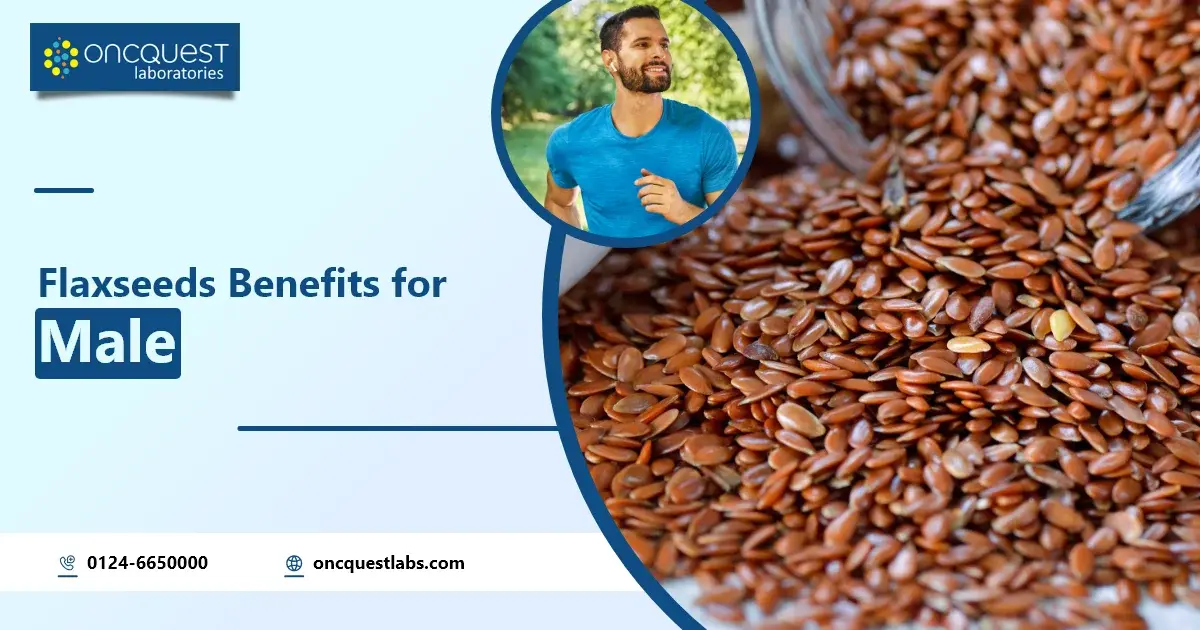Flax seeds, often touted as a superfood for their rich nutritional profile, have gained popularity not only in culinary circles but also in the realm of holistic health. These tiny seeds, derived from the flax plant (Linum usitatissimum), are packed with essential nutrients like omega-3 fatty acids, fiber, and lignans, making them a powerhouse of health benefits. While flax seeds are renowned for their overall health-promoting properties, their specific benefits for male health have increasingly drawn attention.
This article explores the multifaceted benefits of flax seeds for male health, delving into their potential roles in enhancing prostate health, supporting fertility, and promoting overall well-being. From their nutritional composition to specific health benefits and practical tips on incorporation into daily diet, understanding the advantages of flax seeds offers insights into natural approaches for men’s health maintenance. Whether consumed whole, ground, or as an oil, flax seeds present a promising avenue for optimizing male health through simple dietary adjustments.
Contents
Flaxseed Nutrition
Flax seeds are celebrated for their exceptional nutritional content, offering a potent blend of essential nutrients that contribute to overall health and well-being. These tiny seeds are particularly rich in alpha-linolenic acid (ALA), an omega-3 fatty acid crucial for heart health and inflammation control. Additionally, flax seeds are abundant in dietary fiber, both soluble and insoluble, which supports digestive health, aids in maintaining healthy cholesterol levels, and promotes satiety. Another standout feature of flax seeds is their lignan content, a type of phytoestrogen that exhibits antioxidant properties and potential benefits in hormone balance. Together, these components make flax seeds a nutritional powerhouse, offering a diverse array of health benefits beyond their size. Whether consumed whole, ground, or as an oil, incorporating flax seeds into the diet can be a simple yet impactful way to boost nutritional intake and support overall health.
Flax Seeds Benefits for Male
Improving Prostate Health
Flax seeds are beneficial for prostate health due to their rich content of alpha-linolenic acid (ALA), lignans, and fiber. ALA, a type of omega-3 fatty acid, exhibits anti-inflammatory properties that may help reduce prostate inflammation and support overall prostate function. Lignans, phytochemicals found in flax seeds, have antioxidant properties that contribute to hormonal balance, potentially reducing the risk of prostate cancer. Additionally, the fiber in flax seeds promotes regular bowel movements, which can indirectly benefit prostate health by aiding in the removal of toxins and reducing constipation-related discomfort that may affect the prostate gland.
Enhancing Fertility
Flax seeds may support male fertility through several mechanisms. They are rich in alpha-linolenic acid (ALA), a type of omega-3 fatty acid that supports sperm health and motility. The lignans in flax seeds have antioxidant properties that may help protect sperm from oxidative stress, which can damage sperm cells. Additionally, flax seeds contain fiber, which can help regulate hormones and improve overall reproductive health. Incorporating flax seeds into the diet as part of a balanced and nutritious eating plan may therefore contribute to male fertility by supporting sperm quality and reproductive function.
Boosting Libido
Flax seeds have been associated with potential benefits for libido, primarily due to their nutritional composition. They are rich in omega-3 fatty acids, which play a role in hormone production and balance, key factors in sexual health and libido regulation. Additionally, flax seeds contain lignans, compounds that may have estrogenic properties, potentially contributing to enhanced sexual drive. By promoting overall cardiovascular health and reducing inflammation, flax seeds can also indirectly support libido by improving blood flow and enhancing overall vitality. Incorporating flax seeds into a balanced diet may therefore offer a natural approach to supporting healthy libido levels.
Omega-3 Fatty Acids
Flax seeds are a rich source of alpha-linolenic acid (ALA), a type of omega-3 fatty acid that is essential for human health. Omega-3 fatty acids are known for their anti-inflammatory properties, which can benefit numerous aspects of health, including cardiovascular function, brain health, and immune system support. ALA, specifically found in flax seeds, is converted in the body into other omega-3 fatty acids like EPA and DHA, albeit in smaller amounts compared to fish sources. These fatty acids play crucial roles in reducing inflammation, supporting heart health by lowering blood pressure and cholesterol levels, and potentially reducing the risk of chronic diseases such as heart disease and arthritis. Incorporating flax seeds into the diet can thus provide valuable omega-3 fatty acids that contribute to overall health and well-being.
Heart Health
Flax seeds offer significant benefits for heart health, primarily due to their rich content of omega-3 fatty acids, fiber, and lignans. Omega-3 fatty acids, particularly alpha-linolenic acid (ALA) found in flax seeds, help reduce inflammation throughout the body, including the arteries, which can lower the risk of cardiovascular diseases such as heart attacks and strokes. The fiber in flax seeds helps lower cholesterol levels by binding to cholesterol in the digestive system and aiding its removal from the body, thereby supporting healthy blood lipid profiles. Additionally, lignans in flax seeds have antioxidant properties that may contribute to cardiovascular protection by reducing oxidative stress and improving blood vessel function.
Anti-inflammatory
Flax seeds are known for their potent anti-inflammatory properties, primarily attributed to their high content of alpha-linolenic acid (ALA), an omega-3 fatty acid. ALA helps to reduce inflammation throughout the body by blocking the production of pro-inflammatory substances. This action not only supports joint health by alleviating symptoms of arthritis but also benefits overall systemic inflammation, potentially lowering the risk of chronic diseases such as heart disease and diabetes. Including flax seeds in the diet as part of a balanced and healthy eating plan can therefore contribute to managing inflammation and promoting overall well-being.
Improve Gut Health
Flax seeds can be beneficial for gut health due to their high fiber content. The soluble and insoluble fiber in flax seeds supports digestive regularity by promoting bowel movements and preventing constipation. Fiber also acts as a prebiotic, nourishing beneficial bacteria in the gut, which contributes to a healthy microbiome and improves overall digestive function. Additionally, flax seeds contain mucilage, a gel-forming fiber that can help soothe the digestive tract and alleviate symptoms of gastrointestinal discomfort. Incorporating flax seeds into the diet can therefore support gut health by enhancing digestion, promoting regularity, and fostering a balanced gut microbiota.
Athletic Performance
Flax seeds can potentially enhance athletic performance through several mechanisms. Their high content of omega-3 fatty acids, specifically alpha-linolenic acid (ALA), supports cardiovascular health and oxygen delivery to muscles, which may improve endurance and stamina during physical activity. Additionally, the anti-inflammatory properties of omega-3s in flax seeds can aid in reducing exercise-induced inflammation and muscle soreness, promoting faster recovery post-workout. The protein and fiber in flax seeds contribute to muscle repair and recovery, while their nutrient density provides sustained energy levels. Incorporating flax seeds into the diet as part of a balanced nutrition plan can therefore support overall athletic performance and recovery.
Hydration
Flax seeds indirectly support hydration through their nutritional properties. While they do not contribute to hydration directly like water or electrolyte-rich foods, flax seeds contain omega-3 fatty acids and protein, which play essential roles in maintaining skin hydration and moisture retention. Omega-3s help to support the skin’s lipid barrier, reducing moisture loss and promoting overall skin health. Additionally, flax seeds’ fiber content aids in digestion and nutrient absorption, ensuring the body efficiently utilizes water and nutrients for optimal hydration.
Mood Regulation
Flax seeds may contribute to mood regulation due to their rich omega-3 fatty acid content, specifically alpha-linolenic acid (ALA). Omega-3 fatty acids are known to play a crucial role in brain function and neurotransmitter activity, which can influence mood and emotional well-being. Research suggests that omega-3s may help regulate serotonin and dopamine levels, neurotransmitters involved in mood regulation and feelings of happiness. By reducing inflammation and supporting neuronal health, flax seeds’ omega-3s may contribute to improved mood stability and resilience to stress. Incorporating flax seeds into the diet as part of a balanced nutrition plan may therefore offer potential benefits for mood regulation and overall mental health.
Flaxseed Side Effects for Male
While flax seeds are generally considered safe and beneficial for many aspects of health, including male health, there are a few considerations regarding potential side effects, especially when consumed in large quantities:
- Hormonal Effects: Flax seeds contain lignans, which have weak estrogenic properties. In some cases, consuming large amounts of flax seeds may affect hormone levels in men, potentially leading to hormonal imbalance. However, typical dietary intake of flax seeds is unlikely to cause significant hormonal changes.
- Digestive Issues: Flax seeds are high in fiber, which can cause digestive discomfort such as bloating, gas, or diarrhea, especially if consumed in excessive amounts or not accompanied by adequate water intake.
- Allergic Reactions: Some individuals may have allergies to flax seeds, resulting in symptoms like itching, hives, or difficulty breathing. It’s important to be cautious if you have a known allergy to seeds or nuts.
- Medication Interactions: Flax seeds may interact with certain medications, such as blood thinners or hormone treatments. If you are taking medications, consult with a healthcare provider before incorporating flax seeds into your diet to avoid potential interactions.
- Potential Oxalate Content: Flax seeds contain oxalates, which in large amounts could contribute to kidney stone formation in susceptible individuals. However, this risk is generally low with moderate consumption.
To minimize potential side effects, it’s advisable to consume flax seeds in moderation as part of a balanced diet. If you have specific health concerns or conditions, consulting with a healthcare professional before adding flax seeds to your diet is recommended.
Conclusion
Flax seeds emerge as a versatile and nutrient-dense addition to a balanced diet, offering a wide array of potential benefits for male health. From supporting heart health and aiding in digestion to potentially enhancing fertility and promoting mood regulation, the nutritional components of flax seeds, such as omega-3 fatty acids, fiber, and lignans, underscore their role in overall well-being. While generally safe, it’s essential to consume flax seeds in moderation and be mindful of potential interactions or allergies. Incorporating flax seeds into daily meals can provide a natural and accessible way to bolster health and vitality.
Frequently Asked Questions (FAQ)
How should flax seeds be consumed for maximum benefit?
Flax seeds can be consumed ground or whole. Grinding them enhances nutrient absorption. They can be added to smoothies, yogurt, oatmeal, or used as a topping for salads.
Can flax seeds help with weight loss?
Yes, flax seeds are high in fiber and healthy fats, which can promote feelings of fullness and support weight management when part of a balanced diet.
Are there any risks associated with consuming flax seeds?
While generally safe, consuming large amounts of flax seeds may lead to digestive issues or affect hormone levels in some individuals. It’s best to consume them in moderation.
Can flax seeds be eaten by people with nut allergies?
Yes, flax seeds are not nuts and are typically safe for those with nut allergies. However, if you have seed allergies, consult with a healthcare provider before consuming flax seeds.
Are there specific health conditions where flax seeds should be avoided?
People on blood-thinning medications or with hormone-sensitive conditions should consult with a healthcare provider before consuming flax seeds due to their potential effects on blood clotting and hormonal balance.





